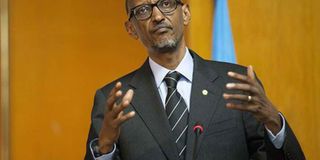Rwanda seeks interview ban over genocide

Rwandan President Paul Kagame talking during a press conference at the National Palace in Addis Ababa on April 16, 2015. The country is demanding a total ban on all people convicted of genocide crimes from being interviewed by journalists in what it says will be a way of preventing them from revising the history of the genocide. PHOTO | ZACHARIAS ABUBEKER |
What you need to know:
- Rwandan Justice Minister Johnston Busingye told a gathering at the closure of the International Criminal Tribunal for Rwanda (ICTR) that the media should be barred from accessing convicts because it reopens the wounds of genocide.
- The Tribunal, which is winding up this month, was formed by the UN Security Council in 1994 to bring to justice alleged perpetrators of the Rwandan genocide where at least 800,000 Tutsis and moderate Hutus were killed by the Hutu militia groups.
- The Rwandan government which has often been sensitive to any media reports trying to revise the history of that genocide argues allowing convicts to say their side of the story is insulting and dangerous.
Rwanda is demanding a total ban on all people convicted of genocide crimes from being interviewed by journalists in what it calls is a way of preventing them from revising the history of the genocide.
Rwandan Justice Minister Johnston Busingye told a gathering at the closure of the International Criminal Tribunal for Rwanda (ICTR) that the media should be barred from accessing convicts because it reopens the wounds of genocide.
In an emotional speech, Mr Busingye criticised the UN tribunal for allowing media interviews to those jailed despite promising not to do so.
“All nations and institutions who want to genuinely stand up and be counted against the ideology of genocide need to take extra caution before granting media access to genocide convicts; because they (convicts) cannot prevent themselves from marketing their genocidal views.”
“The first time, we were promised that it would not happen again.
The second time we received deferring responses from the ICTR and the MICT (Residual Mechanism for Criminal Tribunals).
We all seem to agree, however, that it is wrong, unethical and contrary to policy,” he told a gathering at ICTR headquatres in Arusha.
Winding up this month
The Tribunal, which is winding up this month, was formed by the UN Security Council in 1994 to bring to justice alleged perpetrators of the Rwandan genocide where at least 800,000 Tutsis and moderate Hutus were killed by the Hutu militia groups.
Some of those targeted for trial included a leader of the government and several top government and military officials. It has convicted 61 people out of the initial 93 indictees.
Often been sensitive
The Rwandan government which has often been sensitive to any media reports trying to revise the history of that genocide argues allowing convicts to say their side of the story is insulting and dangerous.
“When genocide convicts are granted media access, it is not only wrong and unethical; it is also callous towards the victims of that genocide.”
Despite convicting 61 people most of who were senior government ministers; the ICTR often enjoyed a lukewarm relationship with the Rwandan government under President Paul Kagame.
In Arusha, Mr Busingye acknowledged the differences but argued its existence had provided valuable lessons to Rwandans.





